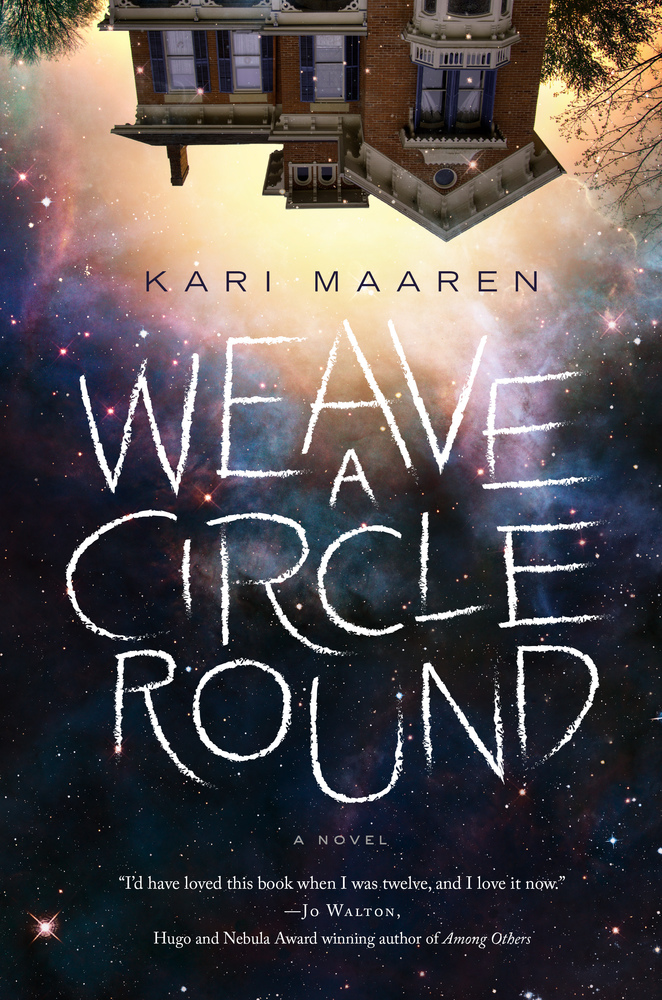It’s hard for me to write about Kari Maaren’s Weave a Circle Round. Part of me just wants to jump and down waving it and saying “It’s just so good you guys!” until you’re all convinced to read it. But that’s not really a review? You’ve come here for critique, right? Scintillating insights into where this book fits into the larger fantasy and/or YA canon?
Well I can start with that: this book fits into the canon. This book belongs on the shelf with your L’Engle and your Earthsea. It has a lot to say about being a teenager, trying to fit in, and dealing with a family situation that, while not abusive, is certainly not supportive or nurturing. There is a great realistic coming-of-age story tucked away in this book. But it’s also about time travel, and that’s where Weave becomes a classic.
Buy the Book


Weave a Circle Round
Freddy DuChamp just wants to be “normal”—to fit in, or failing that, to be invisible. She spends most of her days trying not to be noticed by anyone. She at least had two friends, Rochelle and Cathy, who hung out with her and took some of the pressure from her—it was easier to be part of a small group. But as Freddy enters a new year at high school, she realizes that Rochelle and Cathy have pushed her away, and have begun hanging out with a different crowd. Suddenly they’re slightly more popular, and Freddy is alone. She can still fade into the background, but now she also has to contend with her stepbrother.
Her stepbrother Roland is profoundly Deaf, and along with another small group of Deaf kids, attends special classes for part of the day, and who spends as much time as possible GMing long-ranging LARPs and tabletop games with his friends, usually at the house he and his dad now share with Freddy. This would be bad enough, but he’s also got her little sister Mel, who desperately wants to be Harriet the Spy, playing along. And even worse that that, her new schedule means that Roland is in class with her for part of every day, and his nerdiness surrounds her like a cloud of radiation. It’s clear by the end of the first week at school that the social order has changed, and Freddy, after all of her work at being boring, is on the verge of being labeled a freak.
Then Josiah and Cuerva LaChance show up, and it becomes a completely different type of book. While Josiah looks like a 14-year-old boy, he’s actually an ancient being, and while people assume Cuerva LaChance is his mother, she’s also an ancient being—one who does a much shoddier job of fitting in than Josiah. The pair move into an old rambly house on a cul de sac, and naturally Mel wants to investigate them, because she wants to get involved in a mystery. Roland inexplicably seems to hate them on sight. But it’s Freddy who’s stuck with Josiah (imagine a combination of Charles Wallace Murry and Owen Meany) loudly, persistently, befriending her at school. This pushes her fully into freak territory—but that drama is soon dwarfed by the fact that the two of them have fallen through a time portal.
The middle section of the book follows the pair as they hop through time, from medieval Sweden to Bronze Age China to the Lake District right around 1797. The two can’t control how or when they travel (there’s a bit of a Quantum Leap vibe in that respect) but Freddy starts to suspect that Josiah knows more than he’s telling her. Along the way Freddy is forced to interact with a dizzying array of people, gain new skills, and stand up for herself, all while realizing how much she loves her family, and having to compartmentalize he increasing homesickness so she can survive.
Will they ever get back to Freddy’s time? Who is this mysterious Three that Josiah keeps talking about? And maybe most important: will Freddy ever accept herself, or will she keep trying to disappear?
I don’t want to say too much more about the plot—I went in knowing nothing, and I loved how often I was surprised by the plot twists and time jumps. But I do want to note that this is Kari Maaren’s debut novel, and immediately thereafter note that you would never know that while you’re reading it. The writing here is assured, light, and fun while dealing with serious topics. All of her characters are nuanced, but where she especially shines is in the depiction of Freddy’s inner turmoil.
I have a particularly sharp 6th grade memory I’m going to share with you all. At one point my English teacher made us all pair up and interview each other, and then present the interview to the class. We were supposed to begin the presentation with an overall description of our subject. I hate to admit this, but I cannot remember the boy I interviewed. Even though I remember liking him, and I know I spent time on the presentation, I have zero memory of getting up and reading my paper to everyone. What I do remember is that one of the most popular girls in the class interviewed another boy, and got in an argument without our teacher because her presentation opened by describing him as “an average boy.” Our teacher was trying to point out that this was an insult, but the girl was utterly baffled by that. Now if I was cool I could say “even as a kid I knew it was better to be an iconoclast!” but in actually I remember squirming and completely siding with my fellow student, to the point of becoming annoyed with my teacher for being so obtuse. Every 12-year-old knew there was no higher compliment than average.
And this is what Maaren gets so perfectly in the book. Freddy doesn’t want to be an angry math whiz like Meg Murry or the best witch of her age like Hermione or a kick-ass archer like Katniss or even the owner of inexplicably magical blood like Bella Swan. Freddy wants to be blissfully normal. Freddy wants to get through school with very little interpersonal contact, and maybe have one or two decent friends. That’s it. And of course that’s the very thing she’s denied. Rather than laying weirdness on top of weirdness, Maaren gives us this very raw, very true core for Freddy, and then lets the weirdness spin around her. So even as a jaded professional reader, who has to read sci-fi and fantasy and weird horror and new weird and dark fairy tales and Lovecraftian mystery by the shelf-full, for work, I was invested in all the crap Freddy has to go through, and genuinely captivated by her attempts to stay grounded as she hops through time and space.
On top of all that is Maaren’s emphasis on the importance of story in all forms, from Norse flyting to Romantic poetry to D&D campaigns. This story is relentlessly modern, and puts Doctor Who on an equal plane with myths created around an ancient fire. Story telling is story telling, whether you’re a skald or a GM. But the book also keeps pop culture references fairly light, so you don’t need to be part of any particular fandom to appreciate jokes or riffs.
With Weave a Circle Round, Maaren has given us an engaging heroine and a thrilling new time travel adventure that should fill that tesseract-shaped hole in your reading.
Weave a Circle Round is available now from Tor Books.
Leah Schnelbach want to travel through time! Where is her time travel guide? Come talk to her on Twitter!










